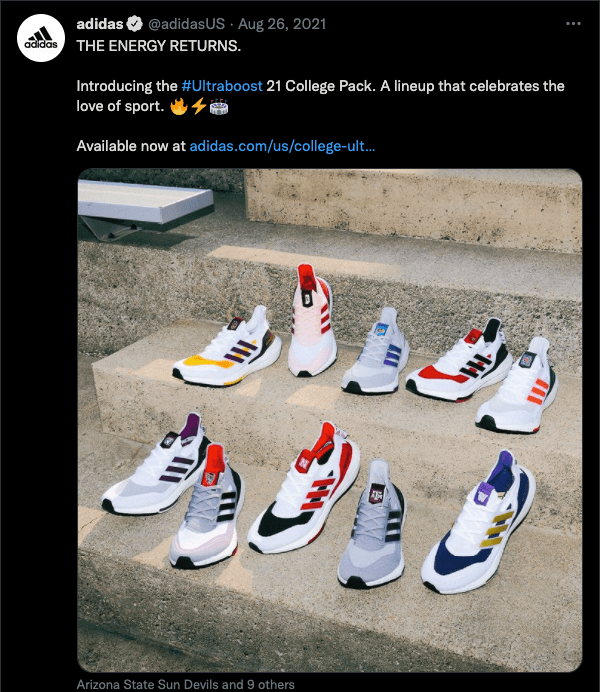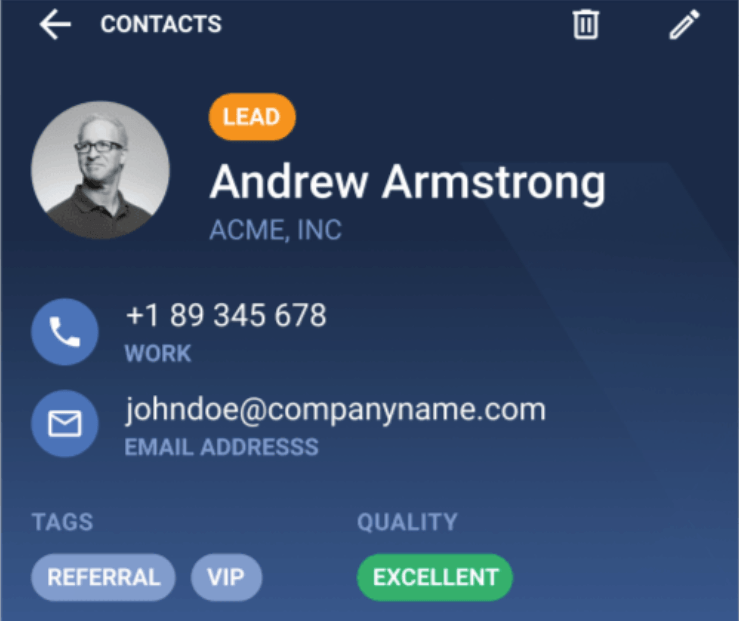Have you ever been on the receiving end of a sales call and felt like the salesperson was speaking another language? This scenario happens often and can leave you feeling confused about what the salesperson offers. Sales terminology is something we’re all exposed to at some point and knowing what the other person is talking about will go a long way and save you time.
To help you get a leg up on your next sales call, we’ve created this sale glossary, with over 30 terms, to help you learn some sales lingo!
If you want to jump ahead, go to the section you want to see terms:
Otherwise keep reading to learn about all the sales terminology you need to know!
P.S. Want to get more tips and tricks for sales, marketing, and beyond? Join 200,000+ savvy marketers by subscribing to Revenue Weekly!
Quick reference common sales terms:
Or head straight to the glossary
ABC (Always Be Closing)
A motivational phrase and sales lingo for a salesperson to always be on the lookout for new prospects, pitching to them and ultimately closing the deal.
AIDA (Attention, Interest, Desire, and Action)
The AIDA model is a cornerstone of modern sales and marketing. This model describes a prospective customer’s stages of thinking and action before deciding to buy or become a client.
BANT (Budget, Authority, Need, and Timeline)
BANT or budget, authority, need and timeline is sales jargon for how salespeople used to qualify leads.
Conversion
A conversion is when a person completes a desired action for your company, such as signing up for an email list or buying a product.
CRM (Customer Relationship Management)
With the help of CRM software, it is the management and database of valuable information about prospects and clients that aids in closing sales.
Discovery call
A discovery call is the initial calls sales reps make to someone to qualify them and figure out the next step.
Lead qualification
Lead qualification is the process of scoring leads to determine which are worth pursuing.
Sales funnel
A sales funnel is the stages a prospect moves through, from being aware of your business to converting into a paying customer.
-
 10 min. read
10 min. read
-
 Macy Storm
Macy Storm Content Marketing Consultant
Content Marketing Consultant
- Macy is a content marketing consultant with over five years of experience creating content for dozens of industries including home services, recreation, and education. She’s written about every marketing topic under the sun, from SEO to AI to email marketing. Her work has been featured by Search Engine Journal, HubSpot, Entrepreneur, Clutch, and more. In her free time, Macy enjoys crafting, reading comic books, and walking her dog Daisy.
Sales Glossary: Sales terms A-C
Ready to dive into some sales terms to know? Here are some terms that fall in A-C!
- Account: An account is where the salesperson stores all the information they need to know about a prospect. This information helps them sell better to prospects.
- AIDA (Attention, Interest, Desire, Action): A cornerstone of modern sales and marketing. This model describes a prospective customer’s stages of thinking and action before deciding to buy or become a client.
- Always Be Closing (ABC): This old sales lingo means that a salesperson should always think about turning leads into sales with every choice they make. In today’s competitive market, the focus is more on Always Be Connecting, as in, always connect with prospects and share information about your business.
- Annual Contract Value (ACV): ACV is the average amount per customer contract. You’ll often compare ACV to lifetime value to see how long it will take to make up the money spent to acquire a customer.
- Annual Recurring Revenue (ARR): This metric shows how much revenue you gain from subscriptions or contracts each year. ARR focuses on the money you get every year from these customers. Read ACV vs. ARR to learn how to distiguish the two.
- Average Revenue Per Account: This sales lingo looks at how much revenue your business receives with each customer account. ARPA looks at the profitability of these accounts for your business.
- BANT: BANT is sales lingo for how salespeople previously qualified leads. It stands for Budget, Authority, Need, and Timeline.
- Bottom of the funnel (BOFU): At the bottom of the sales funnel, the prospect is ready to buy. They’re looking for information that proves why a company or a product is best for their needs.
- Business to business (B2B): Business to business (B2B) selling involves companies selling products or services to other companies. These businesses have to appeal to multiple decision-makers at the company and often have a long sales cycle.

- Business to consumer (B2C): Business to consumer (B2C) selling involves companies selling products or services to individual consumers. These businesses have shorter sales cycles since there’s only one decision-maker.

- Buyer persona: A buyer persona is a fictional representation of actual customers that helps sales teams market to prospects better. These personas help salespeople understand pain points and what matters most to certain types of customers.
- Churn rate: This sales terminology means the percentage of people that stop doing business with you for a set period. To calculate the customer churn rate, you divide the customers you lost in the period by the customers you had.
- Closed-won: Closed-won means that a sales representative closed the deal with a buyer –– they made a purchase or signed a contract.
- Closed-lost: Closed-lost means that the buyer ultimately didn’t convert, and the sales rep lost the sale.
- Closing rate: This sales lingo refers to the number of deals closed. It looks at the rate of people considering the deal and how many closed on the deal.
- Cold calling: This sales lingo is a term for the practice of calling random, potential customers in hopes that they’re interested in what you need. This practice is outdated and often results in more people hanging up than inquiring about the product or service.
- Commission: A common way to encourage and motivate salespeople, a commission is a form of variable-pay remuneration for products sold or services rendered.
- Conversion: When someone completes a desired action for your company. Conversions range from a person signing up for an email list to making a purchase.
- Conversion rate: Conversion rate is the percentage of users who complete a desired action for your business. Most commonly used on websites, the conversion rate is calculated by taking the number of conversions and dividing that by the number of total interactions with your website.
- Customer Acquisition Cost (CAC): Customer acquisition cost or CAC metric is sales lingo for the amount it costs for you to get someone to buy. It considers all the marketing costs you incur to convert that customer compared to how much that customer spends. For medical practices, this is also known as patient acquisition cost.
- Customer Relationship Management (CRM) software: CRM software enables sales teams to manage prospects and track valuable information about them that helps sales teams close sales better.

Sales glossary: D-M
Here are some sales jargon to know that falls in D-M:
- Decision-maker: This sales term means a person who ultimately decides to purchase. For B2C companies, your decision-maker is an individual. For B2B companies, multiple individual decision-makers help the company decide.
- Discovery call: A discovery call is the initial calls sales reps make to someone to qualify them and figure out the next step. Here are questions to ask on a sales discovery call to get you all set.
- Flywheel: The flywheel is a self-sustaining marketing model composed of three stages: attract, engage, and delight. The flywheel model focuses on removing friction at every step of the buyer journey to build trust, credibility, and momentum to foster growth which builds on itself. This model also suggests that conversion can happen at any buyer journey stage.
- Forecasting: Forecasting is the projection of future sales and predicts which leads will move through the sales funnel. Forecasting uses historical data to create a prediction of future sales trends.
- Gatekeeper: This person prevents the information from going directly to a decision-maker, like a receptionist. This sales jargon is critical to know to understand who keeps you from getting to the decision-maker.
- Lead: A lead is a person that shows an explicit interest in your company. People who express interest in your company are good candidates for turning into customers or clients.
- Lead Qualification: Lead qualification is a process where you score leads to determine if they’re worth pursuing. This process is critical to ensure that sales reps spend their time nurturing the most qualified leads so that companies can earn more sales.
- Lead scoring: Lead scoring is when companies give leads points for having certain attributes or completing specific actions, which helps them qualify those leads for their sales team.
- Lifetime Value: The lifetime value is a prediction of how much a customer is worth for the entirety of their relationship with a company. Loyal customers tend to have a higher lifetime value because they continually buy from your business.
- Margin: A sales margin is the amount of money a company makes after all costs are deducted from a sale or service.
- Mark-up: Mark-up in business refers to the retail price of a product or service minus its cost. This is the amount the company adds to the costs of rendering a service or selling a product.
- Marketing Qualified Lead (MQL): A marketing qualified lead is someone who shows interest in a business through their marketing. Marketing qualified leads are a good starting point for finding people who may eventually turn into sales qualified leads.
- Middle of the funnel (MOFU): At the MOFU stage of the sales funnel, prospects are weighing their options and narrowing their focus to a shortlist of businesses that meet their needs. This stage requires showing prospects what you offer and how it will help them.
- Monthly Recurring Revenue (MMR): This sales lingo means the amount of revenue your business receives every month. Companies that offer reoccurring or subscription services track this metric often.
Sales glossary: N-Z
To wrap up our list of sales terms, let’s look at some terms that fall between N-Z:
- Net promoter score: This term is one of the sales terms that focuses on how customers perceive your business. Net promoter score looks at how likely your current customers are to recommend your business to others. You can gather this data by sending out surveys.
- Objection: An objection is an expression by a prospective buyer that they are hesitant or uninterested in what a salesperson is trying to sell to them. A sales objection is a sign that more work needs to be put into the sales process to remove the barriers to conversion.
- Onboarding: Onboarding is sales slang for helping prospects learn how to get started with your product or service after deciding to buy. This process is critical for companies that offer solutions like software because prospects may still need help getting started.
- Pain point: A pain point is something that a customer needs a solution to solve. Paint points can cover a wide array of needs, from budget constraints to ease of use.
- Pipeline: A pipeline is a visual representation of where your prospects are in the sales process. A pipeline lets you gauge likely sales, revenue and health of your business.
- Profit margin: The profit margin of a business is the amount by which its revenue exceeds the cost of running the business.
- Prospecting: Prospecting is sales terminology for looking for potential buyers. This first step helps companies identify potential leads and turn them into clients or customers.
- Quota: A quota is a set expectation a salesperson can achieve during a specified period to earn their target incentive pay and meet sales goals.
- Sales funnel: The sales funnel is the process prospects go through from being aware of your business to converting. It features stages like awareness, consideration, and decision.
- Sales Qualified Lead (SQL): A sales qualified lead is someone who has a high likelihood of purchasing because they’ve moved down the sales pipeline. These prospects show enough interest in your product or service that they’re ready to talk with a sales rep.
- SLA (Service Level Agreement): An SLA is a commitment between a service provider and a client which outlines the products and services provided, the point of contact and the metrics by which progress and success are determined.
- Smarketing: Smarketing is jargon for the intersection between a business’s marketing and sales processes. The smarketing objective is to have a common goal for both the sales and marketing teams for an integrated approach.
- Top of the funnel (TOFU): TOFU is the first part of the buyer’s journey where the buyer discovers they have a problem and seek out solutions.
- Upselling: Upselling is sales lingo for encouraging customers to make a more expensive or larger purchase. Sales reps often upsell to prospects, leads, or current customers who may need more advanced solutions or accessories to go with a specific product.
- Value proposition: The value proposition is the benefit of investing in your product or service.
Brush up on your sales terminology today
With this glossary of sales terminologies, sales jargon and slang, you’ll be fast on your way to understanding sales lingo. Whether you’re a salesperson looking to up your sales vocabulary or a client looking to understand salespeople better, this glossary is a pocket guide to help you communicate better.
And if you want to gain access to more helpful information regarding marketing your business, subscribe to Revenue Weekly!
-
 Macy is a content marketing consultant with over five years of experience creating content for dozens of industries including home services, recreation, and education. She’s written about every marketing topic under the sun, from SEO to AI to email marketing. Her work has been featured by Search Engine Journal, HubSpot, Entrepreneur, Clutch, and more. In her free time, Macy enjoys crafting, reading comic books, and walking her dog Daisy.
Macy is a content marketing consultant with over five years of experience creating content for dozens of industries including home services, recreation, and education. She’s written about every marketing topic under the sun, from SEO to AI to email marketing. Her work has been featured by Search Engine Journal, HubSpot, Entrepreneur, Clutch, and more. In her free time, Macy enjoys crafting, reading comic books, and walking her dog Daisy. -

WebFX is a full-service marketing agency with 1,100+ client reviews and a 4.9-star rating on Clutch! Find out how our expert team and revenue-accelerating tech can drive results for you! Learn more
Try our free Marketing Calculator
Craft a tailored online marketing strategy! Utilize our free Internet marketing calculator for a custom plan based on your location, reach, timeframe, and budget.
Plan Your Marketing Budget

Proven Marketing Strategies

Proven Marketing Strategies
Try our free Marketing Calculator
Craft a tailored online marketing strategy! Utilize our free Internet marketing calculator for a custom plan based on your location, reach, timeframe, and budget.
Plan Your Marketing Budget
What to read next





